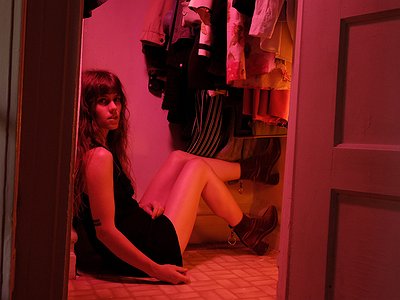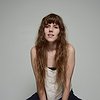Part 1
Name: Katie Von Schleicher
Nationality: American
Occupation: Songwriter, keyboarder, singer
Current Release: Consummation on bandcamp
Recommendations: The book Her Body and Other Parties by Carmen Maria Machado. It’s short stories in a style of pseudo folk / horror. The movie In The Mood For Love by Wong Kar-wai. It’s one of the most beautiful things I’ve seen in recent memory.
If you enjoyed this interview with Katie Von Schleicher, make sure to also check out her website and facebook profile or to follow her on Twitter.
When did you start writing/producing music - and what or who were your early passions and influences? What is it about music and/or sound that drew you to it?
I started writing when I was ten, and had finished songs around age 14. There were pianos in my parents and grandparents’ houses, and I split my time between those places. I think the pianos were just furniture to everyone. I loved to sing, that’s how I got into it. I loved Whitney Houston and Mariah Carey and a lot of other radio hits. I remember bringing my boom box with a cassette of “I Will Always Love You” into my parents’ bedroom and ‘performing’ it for them. When I was very little, I remember having the thought that if I could just learn to write a song for Celine Dion or Whitney Houston, there would be more good songs to sing.
For most artists, originality is first preceded by a phase of learning and, often, emulating others. What was this like for you? How would you describe your own development as an artist and the transition towards your own voice? What is the relationship between copying, learning and your own creativity?
All of this is hilariously out of touch with how my music sounds now, but I just had all these karaoke CDs of Mariah Carey and Christina Aguilera and Whitney Houston, I was so into big powerful voices. It’s been a long road, I could write a boring book about it. First it was singing, which was natural to me, then in high school, because I was not diligent about learning things I did not want to learn, I approached a music teacher and asked him if he would teach me piano, but only what I wanted to learn, which was how to know what I’m doing with songwriting. He taught me that I was playing chords, he prepared me with harmony. I was studying voice but for classical music at the time. I went to a music college and felt very underprepared, like I did not belong, and my contrarian personality kicked in again and I skipped a lot of class to read books.
But at age 20 I had my first band. Eventually I made an album at a studio in Medford, MA, called The Soul Shop, and became close friends with the engineer Elio DeLuca, who recorded only to tape, and opened my mind to aesthetics. My friend Martín gave me a four track cassette machine, and I learned that. I learned how to record myself and made Bleaksploitation, the first thing I produced on my own. It opened up a whole new world of possibility.
I’ve learned other instruments and how to record, and much like how I got into music, it’s just all out of the necessity to write and make music in a self-sufficient way. It feels like freedom. Copying and learning are integral to being creative, they’re all tools. Some say artists shouldn’t be derivative, or copy, but I disagree for myself. The more roles I’ve tried to occupy, the closer I’ve come to finding my own voice. It’s a lifelong pursuit I guess.
What were your main compositional- and production-challenges in the beginning and how have they changed over time?
Writing is hard in the way that simply being sentient is hard. In the beginning, I wrote in stolen moments when I was completely alone, and it was just expression (I’ve subsequently returned to that). When I learned more about what I was doing, my self-consciousness grew exponentially.
My compositional challenges are psychological, it’s kind of funny. So now I have an elaborate process for avoiding my thinking brain when writing. I swap instruments, I will write from the ground up (from a beat first) or top down (melody first), I take something I’ve composed and I try it in different keys, at different tempos. Nothing is fixed. Production is still relatively new and it’s really helped me to love making music. I have to write music but sometimes I loathe it.
Production is a playground of ideas. Sometimes I tell myself that it doesn’t matter if a song is good. You could take a terrible folk song with two chords and put in in a world with sawtooth wave oscillators and fuzz and drum machines, you could take the chords out entirely, you can reharmonize the two chords into a bizarre progression, you can sing a terribly grating harmony over top. What are songs? Ha.
What was your first studio like? How and for what reasons has your set-up evolved over the years and what are currently some of the most important pieces of gear for you?
My first home studio was just a windowless practice space in Brooklyn with a Tascam 4-track. I sang through guitar pedals. My friend Judd, who is now my booking agent in the US, gave me a drum set and a bass. I had never played drums or bass or electric guitar, so I played them terribly. That was how I made Bleaksploitation. For Shitty Hits I upgraded to 8 tracks of cassette and did basics collaboratively with bandmates Julian Fader and Adam Brisbin.
Then I learned how to use Logic and an interface and added a whole world on top of that digitally. For Consummation I decided to go digital entirely, I bought plugins and really learned how to record properly, stopped singing through pedals. I need a whole set of fresh parameters when making an album, to motivate myself, to move the target. I listened to Bleak for the first time in years recently and realized that it wasn’t the methodology that made it so primitive, it was that I was absolutely terrible at instruments. I’ve just set up an 8 track Tascam TSR-8 ½” reel to reel machine in my house with a Tascam M-30 mixer, so I’m heading back into tape world, because now I can actually play instruments. I love my black Rickenbacker 620 guitar, I love this vintage short scale franken-bass I just bought - bass is the instrument I’m tackling at the moment (just learned “May I?” by Kevin Ayers).
I’ve been obsessed with pedals and then obsessed with plugins, and now I have this focus on microphone placement, room sound, trying to be comfortable with drier sounds, and exploring the full diverse potential of overdrive and fuzz. My microphones are a Neumann U87 condenser, a Coles 4038 ribbon, an AEA R84A ribbon, and I’d like to get a Sennheiser 441 dynamic. I love this 1974 Fender Champ amp I have, when you turn the treble and bass up to 10.
Keyboards! I have a piano, a Juno 6 synthesizer, a Korg Minilogue, a Yamaha Reface CP, a Yamaha VSS-30, a Wurlitzer and a Rhodes. Half of this stuff I’ve been given or it’s on extended loan, but for a home studio in an apartment building I feel extremely set. When it comes to gear, I don’t like digital sound banks with enormous potential. I am simple, I like to have something that fills one purpose, so I can figure out how the heck it actually works.
How do you make use of technology? In terms of the feedback mechanism between technology and creativity, what do humans excel at, what do machines excel at?
What a question! This is at the crux of why production is liberating to me. Technology is a randomizer, an unyielding collaborator. I like to stay half in the dark about the technology I’m using, so that what I feed into it is warped in a way I couldn’t perfectly predict, and fed back to me so that I might pay attention in a fresh way. Humans, in my case, provide raw material, which, given the fact that we are all influenced by the music that exists, doesn’t make us so different from a machine perhaps. Machines excel at their small or large constrained purposes, and depending on their being analog or digital have different ranges of variation in what they send back to us. A pedal board is just a whole set of machines interacting with one another in any number of ways. Some humans excel at an intricate knowledge of this alchemy, I like to excel at being surprised by what machines do.
Production tools, from instruments to complex software environments, contribute to the compositional process. How does this manifest itself in your work? Can you describe the co-authorship between yourself and your tools?
Every album I make has a different set of tools that affect its meaning as much as the words or writing do. For me, the methodology is, because I’m not often asked these types of questions, the silent partner. I decide on a thematic framework and a title before I start an album, ideally I would have the album cover designed as well, and I decide on a particular set of production tools. They all become one thing to me.






